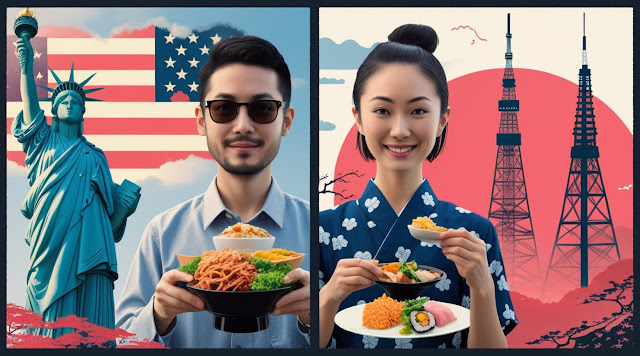Have you ever been shocked by another country’s culture? I have. The first
time I went to Japan, I made a huge mistake—I tipped the restaurant server.
Their reaction? A confused look and a polite but firm refusal. I thought they
rejected it because the amount was too small. Turns out,
tipping in Japan is considered rude because providing good service is
an obligation, not something that should be “rewarded extra.”
That’s just one of the many cultural differences between Japan and America. If
you plan to live, work, or just travel to Japan, you better understand the
major differences in communication, work ethics, and social norms there. So
you don’t embarrass yourself like I did!
What is the difference between Japanese and American culture?
Following are some of the cultural differences that exist between the two cultures.
1. Individualism vs. Collectivism: Who Matters More?
In America, you’re taught from a young age to
chase your personal dreams, stand out, and be the best. In Japan,
what’s more important is group harmony. This is very evident in the
workplace—in the U.S., you can be ambitious about climbing the corporate
ladder on your own. In Japan? You have to think about the team before
yourself. You can’t just throw out ideas without considering their impact on
the group.
I once worked on a business project with a Japanese team. At first, I was
frustrated because every decision required long discussions. In America, if my
idea was good, we’d just go for it. In Japan? Every decision is made through
consensus so that no one feels left out. It takes time, but I eventually
realized that this approach creates a more harmonious and conflict-free work
environment.
2. Communication Style: Blunt vs. Reading the Atmosphere
America is known for its straightforward culture. Like it or not, if your boss
is unhappy with your work, they’ll tell you directly. Japan? The opposite!
They prefer indirect communication, known as haragei (communicating through
expressions and gestures).
I experienced this firsthand. During a project discussion with a Japanese
team, they simply said, “Hmm, that’s interesting,” while smiling. I thought my
idea was great. Turns out, that was their way of saying, “It doesn’t work, but
we don’t want to embarrass you.” Lesson learned: when talking with Japanese
people, you have to pay close attention to expressions and tone of voice.
3. Decision-Making: Fast vs. Consensus-Based
America is all about “fast and decisive” decisions. If something needs to be
decided, the boss can just say, “Let’s do this.” Japan? No instant decisions.
Everything must go through nemawashi (informal discussions before making an
official decision).
Honestly, I was annoyed at first. “Why make it complicated? Just decide
already!” But after understanding it, I realized that this system makes
everyone feel involved. The result? Decisions are stronger and more widely
accepted.
4. Work Ethic: Work Hard vs. Work to Death?
Americans are known for their hard work, but they also understand the concept
of “work-life balance.” In Japan? Overtime is part of the culture. There’s
even a term karoshi (death from overwork). Many Japanese employees stay at the
office late into the night out of loyalty to their company.
I once saw my Japanese friend working from morning until nearly midnight. I
asked, “Why don’t you go home?” He replied, “If I leave early, it looks like
I’m not serious.” Crazy, right? In America, if you work that much, people
would call you a workaholic.
5. Social Etiquette: PDA? No Way!
In America, you see couples hugging or giving small kisses in public, and
nobody cares. Japan? Nope. Public displays of affection (PDA) are considered
inappropriate. Even married couples rarely hold hands in public.
Once, I reflexively went for a high-five with a Japanese female friend after
winning a small competition. She was shocked and stepped back. Then I
realized, in Japan, physical contact is not common, especially in public.
6. Respect for Elders: Different Approach, Same Value
Americans respect their elders too, but the way they show it is very
different. You can casually chat with your boss or older people like friends.
In Japan? Hierarchy matters. There are strict rules on formal language to show
respect to seniors or superiors.
I tried learning keigo (formal Japanese), and honestly, it’s super
complicated! One small mistake, and you might come off as disrespectful. But
it shows how deeply rooted respect is in Japanese culture.
7. Small Things That Can Be a Big Deal
- Tipping: Required in America, rude in Japan.
- Cleanliness: Japan is incredibly clean! You have to take your trash home if
there’s no trash bin around. - Punctuality: Both cultures value punctuality, but Japanese people take it to
an extreme. Don’t even think about being late!
So, Which Is Better?
Neither is better or worse—it all depends on perspective. If you love freedom
and openness, America might suit you. But if you prefer structure and harmony,
Japan could be a great fit.
As for me? After experiencing both cultures, I’ve learned to be more
adaptable. Take the best from both be assertive like an American but maintain
harmony like the Japanese.
So, if you’re visiting Japan or working with Japanese people, remember to
understand their culture so you don’t make any missteps!

